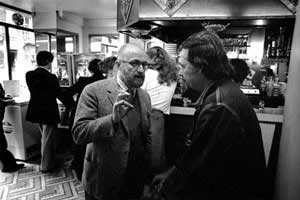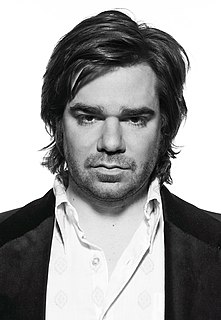A Quote by Jean-Luc Godard
There are different kinds of painting, some with lights and some without, but still if you look at any painting here (in the light) and then over here (out of the light) it's an entirely different thing. The consciousness of this came to the Impressionists and I'm very interested in that.
Related Quotes
Stained glass is unique from the outside, but as a painting insider, I know that oil painting's all about light. And it's about the depiction of light, the way that it bounces off different types of skin, different landscapes. The mastery of that light is the obsession of most of my painter friends.
My experience with life is that it's very fragmented. In one place certain kinds of thing occur, and in another place a different kind of thing occurs. I would like my work to have some vivid indication of those differences. I guess, in painting, it would amount to different kinds of space being represented in it.
Painting is my profession, because it has always been the thing that interested me most. I'm of a certain age, I come from a different tradition and, in any case, I can't do anything else. I'm still very sure that painting is one of the most basic human capacities, like dancing and singing, that make sense, that stay with us, as something human.
But I have a problem with the term 'light'. I never in my life knew what to do with that. I know that people have mentioned on some occasions that 'Richter is all about light', and that 'the paintings have a special light', and I never knew what they were talking about. I was never interested in light. Light is there and you turn it on or you turn it off, with sun or without sun. I don't know what the 'problematic of light' is. I take it as a metaphor for a different quality, which is similarly difficult to describe. Good.
I wasn't interested in sport or anything obvious, so I didn't stand out. I was interested in music, but I couldn't read music, so I wasn't allowed to do the GCSE. I was interested in painting, but no one's interested in a 16-year-old boy who's interested in painting. I wanted to get out of school very, very quickly.
Every single painting is different. I'm always trying to figure out what I'm interested in. Usually when I go through and I make the collages or the images for ideas that I want to paint, it's like an Ouija board. Each painting I do is trying to understand what the hell I'm looking at, or want to look at.
I was always interested in drawing and painting. I enrolled in college to study painting. But I didn't have any livelihood when I graduated. My mother died very young, and I didn't have any home, so I had to find a way to earn a living. It seemed to me that photography - to the great disappointment, I have to say, of my painting teacher - could offer that. So I went and did a degree in photography, and then after that I could go out and get paid for work. For portraits, things like that.
My worlds are completely different. Painting is a peaceful world, and it's a different vibe than having a great match. You are able to look back at what you created when you finish. Recording music is an entirely different monster. When you finally write something, you do a demo and then you go into the studio. Doing the master version, that's the best feeling ever - especially when you're so proud of what you've written, and you can't wait for people to hear it. That's actually very similar to trying to tell a story in a wrestling match.




































